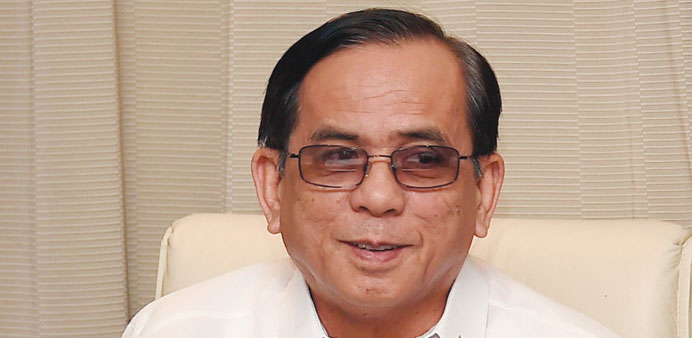By Peter Alagos/Business Reporter
The implementation of Qatar’s much-anticipated Wage Protection System (WPS) on November 3 will help lessen salary-related complaints lodged against employers, Philippine labour attaché Leopoldo De Jesus said.
“The implementation of the WPS will have a major impact on the working relationship between employer and employee as this will lessen complaints related to unpaid or delayed payment of salaries.
“It is a commendable effort by the Qatari government and as such, it needs to be implemented as soon as possible for the benefit the country’s burgeoning workforce, specifically OFWs (Overseas Filipino Workers) who experience these problems,” De Jesus told Gulf Times yesterday.
Labour ministry official Saleh al-Shawi announced in a press conference yesterday that the government is “ready” to enforce the WPS on November 3. The new salary system requires companies to pay wages once or twice a month through bank accounts.
De Jesus’ statements were echoed by first secretary and consul Gonaranao Musor, who said: “The advantage of the WPS is that it would make salary transactions more transparent and it will make employers accountable thus, avoiding issues like unpaid or delayed salaries of workers.”
He added: “This is something that our OFWs will benefit from, especially low-skilled workers. Even other Filipino professionals working in Qatar who could be experiencing delays in their salaries will benefit from this new system.”
According to De Jesus, issues on delayed or unpaid salaries are felt less by skilled or highly-skilled professionals unlike those employed by small companies.
“But it is still an issue for those employed in small companies like manpower suppliers and sub-contractors. If these companies will be covered by the WPS, their employees will benefit significantly from it. I also hope that the WPS will include small companies; there could be exemptions but I am still not fully-aware of the law’s provisions,” De Jesus explained.
The labour attaché also said many workers will benefit from the WPS if it would be expanded to cover housemaids, who, like thousands of labourers, are basically not covered by Qatar’s labour law.
“If the WPS would be expanded to cover housemaids, since they get their salaries directly from their employers and not through the banks, it could work to the advantage of many workers,” De Jesus said.
According to De Jesus, housemaids comprise 18% of the total OFW population in Qatar. “We also do not have many Filipinos working in Qatar’s construction sector but we do have a significant presence of Filipinos working as technicians, welders, carpenters, masons, tile setters in big companies.”
Representatives of businesses with a relatively small workforce, such as some of the country’s automobile garages, feel they may face some challenges while adhering to the Wage Protection System (WPS).
Under the WPS, which is to be implemented from November, wages are to electronically transferred to the bank accounts of workers.
At present, most of these businesses usually pay their workers in cash once a week, usually on Thursday afternoon.
“This has been the case for many years and things have gone on well. Workers like receiving the cash on a weekly basis. Technically speaking, it would not be hard to open a bank account for every worker and transfer his salary once a month, but this would make most of them feel uncomfortable. They may think that the payment is getting delayed; besides, they feel better when they get cash,” said a manager of an automobile workshop in the Industrial Area.
While a large number of workers have welcomed the implementation of the WPS, some have expressed doubts over it.
Most workers believe that the new system will be beneficial as wages will be deposited regularly in their bank accounts and they will not have to worry about where to keep the money. Most of these workers live in shared accommodation units in large numbers and there is a possibility of thefts, it is observed.
Further, these workers feel the WPS will require their sponsors to pay on time as the system will be monitored by the government.
Others, however, are wary that the system will make things difficult for a section of workers, including those who work for people who are not their original sponsor.

Philippine labour attachu00e9 Leopoldo De Jesus.
